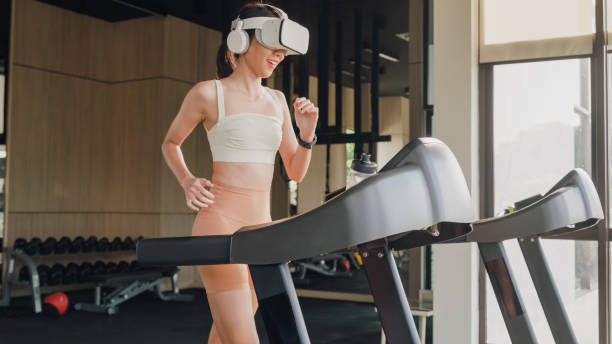Research
Does Fitness AI Work
As fitness technology advances, more and more AI-powered fitness applications and devices enter the market. These applications claim to provide individualized exercises and training regimens to assist users achieve their fitness objectives. But the question remains: Does fitness AI work?
Artificial intelligence has the ability to transform the fitness business by analyzing data and developing personalized workout routines based on individual needs. However, other experts believe that these apps are not yet advanced enough to give really individualized workouts. While they may consider age, weight, and fitness level, they may be unable to precisely analyze an individual’s strengths and limitations, as well as injuries or medical concerns.
Despite these issues, many users have reported excellent outcomes while utilizing fitness Artificial intelligence apps. These applications can add incentive, accountability, and structure to a training regimen. Some apps even utilize machine learning to alter workouts depending on user feedback, thereby increasing their effectiveness over time. Ultimately, the effectiveness of fitness AI may be determined by the individual user and their personal fitness goals.

Evaluating Fitness AI Applications
When considering fitness AI applications, there are various important things to consider. In this section, we will look at data and algorithm efficiency, user involvement and feedback, and how fitness AI compares to traditional training methods.
Data and Algorithm Efficiency
One of the primary advantages of adopting fitness AI is the capacity to collect and analyze massive volumes of data. This information can be used to design individualized exercises and nutrition regimens depending on a person’s goals, fitness level, and preferences. However, not all fitness AI applications have the same data and algorithm efficiency.
It is critical to select a fitness AI application with a robust algorithm and reputable data sources. Look for apps that employ machine learning and AI to constantly improve their algorithms and recommendations. In addition, ensure that the application’s data sources for calorie tracking and nutritional information are reliable and up to date.
User Engagement and Feedback
User engagement and feedback are also essential considerations when evaluating fitness AI solutions. A successful fitness AI program should be interesting and motivational, offering users useful feedback and encouragement as they progress through their fitness journey.
Look for programs that allow you to track your progress, create goals, and receive tailored feedback. Consider the application’s user interface as well as the overall user experience. Is it easy to navigate and use? Does it offer useful information and direction along the way?
Fitness AI vs. Traditional Training
While fitness AI applications can be a useful adjunct to traditional training, they do not replace human personal trainers. Traditional training has several advantages that fitness AI cannot match, including the capacity to provide hands-on coaching and real-time feedback.
However, fitness AI can be an excellent supplement to traditional training, providing consumers with individualized recommendations and support. Furthermore, fitness AI applications can be a more cost-effective and handy alternative for individuals who cannot afford or do not have access to traditional personal training.
To summarize, while evaluating fitness AI applications, it is critical to consider elements such as data and algorithm efficiency, user engagement and feedback, and how fitness AI compares to traditional training. Users can have a more personalized and successful fitness experience by selecting a high-quality fitness AI application that fits these requirements.

Technological Integration in Fitness
As technology advances, we see an increasing integration of AI in the fitness industry. AI-powered personalization and wearable technology are just a few examples of how technology is being utilized to improve our fitness experiences.
AI-Driven Personalization
One of the most significant advantages of AI in fitness is the capacity to customize workouts and fitness routines. Fitness apps can employ AI algorithms to assess data such as heart rate, energy levels, and sleep patterns in order to generate individualized workout routines for users. This can help people meet their exercise objectives more successfully and efficiently.
Popular fitness applications, such as MyFitnessPal and Fitbit, use artificial intelligence to deliver personalized diet planning and activity recommendations based on user data. Furthermore, AI-powered virtual personal trainers can offer consumers real-time feedback and instruction throughout workouts, making it easier to acquire appropriate form and technique.
Wearable Technology and Health Tracking
Wearable technology is also becoming more popular for tracking fitness progress and health. Smartwatches, such as the Apple Watch and Android Wear devices, can monitor metrics like heart rate, blood pressure, and energy levels, giving users vital information about their health and fitness.
Wearable technology can track sleep habits as well as physical indicators and make recommendations to improve sleep quality. This can be especially beneficial for people who struggle to obtain enough restorative sleep.
Overall, incorporating AI and wearable technology into fitness has the potential to transform the way we approach health and fitness. Individuals can attain their fitness objectives more efficiently and successfully with individualized workout schedules and real-time feedback. Furthermore, the ability to monitor physical metrics and sleep patterns can provide useful information about general health and well-being.

Maximizing Workout Effectiveness
Many people fail to see benefits from their workout efforts. One of the primary reasons for this is that they do not follow a planned training plan tailored to their fitness objectives and demands. This is where AI-enabled fitness apps come in, since they can help us make the most of our workouts.
Structure and Planning
One of the primary advantages of adopting artificial intelligence in fitness is that it may assist us in developing an organized workout plan that is personalized to our specific demands. AI algorithms can create individualized workout routines that take into consideration our present fitness level and help us advance toward our goals by examining factors such as our weight, training experience, and intended fitness goals.
In addition to designing a tailored fitness plan, AI can help us track our success and alter our workouts as needed. AI algorithms can help us improve and enhance the effectiveness of our exercises by assessing data like as the number of reps and sets we accomplish, as well as our tempo and recovery time.
Recovery and Adaptive Training
Another method AI can help us improve the efficacy of our workouts is by providing insights on recovery and adaptive training. By assessing parameters such as our heart rate variability and sleep patterns, AI systems can prescribe recuperation time and adaptive training tactics to help us prevent damage and maximize our progress.
In addition to making recommendations for recovery and adaptive training, AI can help us log our daily workouts and provide real-time feedback on our form and technique. This is especially useful for novices who are just getting started with a new fitness regimen and require instructions on how to do exercises correctly.
Overall, AI-enabled fitness apps can be a valuable tool for increasing the effectiveness of our activities. AI can assist us in meeting our fitness objectives and seeing tangible results by giving us with individualized workout routines, tracking our progress, and insights into recovery and adaptive training.

Future of Fitness AI
As the global artificial intelligence industry expands, new trends in fitness AI technology are gaining popularity. Machine learning algorithms, in conjunction with computer science and human intelligence, are being utilized to build individualized workout regimens, track fitness progress, and deliver real-time feedback to customers.
Emerging Trends and Market Growth
According to a new Allied industry Research analysis, the fitness AI industry is predicted to expand at a compound annual growth rate of 24.3% between 2021 and 2030. This expansion is being driven by the growing need for tailored fitness solutions and real-time feedback.
Wearable technology has become one of the most popular developments in fitness AI. Wearables like smartwatches and fitness trackers collect data on users’ fitness behaviors, which are then processed by machine learning algorithms to deliver personalized recommendations and feedback.
Another trend is to use virtual personal trainers. These AI-powered trainers employ natural language processing and speech recognition technology to offer users individualized workout plans and real-time feedback. This gives users the same amount of advice and encouragement as a professional personal trainer, but at a lesser cost.
Ethical Considerations and User Trust
While the potential benefits of fitness AI are enormous, there are some ethical concerns that must be addressed. One of the most pressing concerns is the possibility of bias in the algorithms used to develop individualized fitness regimens. If the data utilized to train these algorithms is biased, the resulting suggestions may be inaccurate or unfair.
Another concern is user trust. Users must be confident that the data acquired by fitness AI gadgets is being handled responsibly and ethically. This necessitates open and direct communication between users and the corporations who manufacture these products.
Finally, the future of fitness AI appears bright, with emerging trends and market development fueling innovation in the sector. However, ethical considerations and user trust must be considered to guarantee that this technology is used responsibly and beneficially.
Conclusion
One of the standout features of Fitness Artificial intelligence is its ability to tailor workouts to my specific needs and goals. Through sophisticated algorithms and data analysis, the Artificial intelligence system adapts exercises, intensity, and duration based on my fitness level and progress. This personalized approach has not only optimized the effectiveness of my workouts but has also kept me motivated by offering challenges that align with my capabilities.
The real-time feedback provided by Fitness Artificial intelligence during workouts has been a game-changer. Whether it’s correcting my form, tracking my performance metrics, or offering timely encouragement, the AI-driven guidance has elevated my exercise routines. This interactive and responsive element has turned every session into a dynamic and engaging experience, fostering a sense of connection and accountability.
The convenience factor cannot be overstated. Fitness Artificial intelligence brings the gym to me, eliminating the constraints of time and location. I can access tailored workouts anytime, anywhere, making it easier to stay consistent with my fitness routine. The adaptability to different environments, whether I’m at home, traveling, or outdoors, adds a layer of flexibility that traditional fitness methods may lack.
Journey of self discovery


